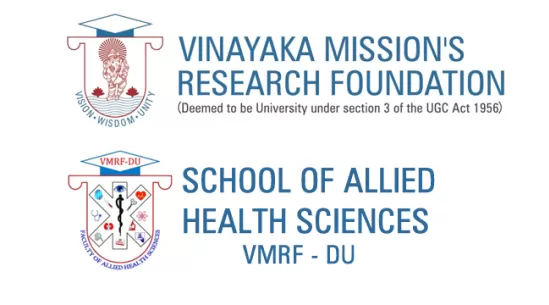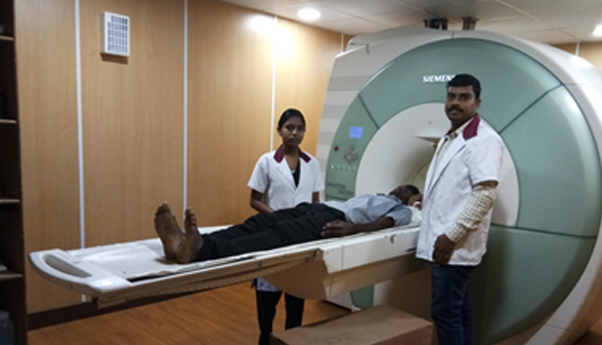UG
B.Sc.Nuclear Medicine Technology
Course Description
Objectives
- This course will develop your knowledge and practical skills relating to the theory and application of instrumentation used in clinical nuclear medicine. This course focuses on the technology, physics and instrumentation that underpin contemporary clinical nuclear medicine technology.
- Building upon a comprehensive coverage of the underlying physics, you will learn the technical basis of the instrumentation and procedures that you will encounter in your clinical experience. Consideration is placed on the expanding role of digital image processing and visualization technology in diagnosis.
- Radiation safety and risk management
- Implement safe radiation practice appropriate to your division of registration
- Protect and enhance patient/client safety
- Confirm and operate equipment and instrumentation safely as appropriate to your division of registration
- Maintain safety of self and others in the work environment appropriate to your division of registration
- Safely manage radiation and radioactivity in the environment
- Practice in medical radiation sciences
- Apply principles of medical radiation physics and instrumentation
- Demonstrate proficiency in obtaining a relevant patient history.
- Demonstrate knowledge of various radiopharmaceuticals and their uses in nuclear medicine imaging.
- Knowledge of radiation therapy procedures used in nuclear medicine.
Outcomes
At the end of the Programme the students will able to:
- Demonstrate ability to provide basic nursing care and cardio-pulmonary resuscitation
- Demonstrate appropriate actions for confirmation when a patient is presented for a nuclear medicine procedure
- Demonstrate the ability to assess and describe patient clinical presentation
- Demonstrate knowledge of anatomy and physiological function of specific organs or organ systems on a nuclear medicine image
- Demonstrate knowledge of the pathological processes within the organs or organ systems being evaluated
- Demonstrate departmental radiation safety and emergency procedures anad personal radiation safety measures
- Demonstrate knowledge of radiopharmaceuticals, their characteristics, and bio distribution that are used for specific nuclear medicine procedures
- Demonstrate knowledge of identifying indications for nuclear medicine diagnostic and therapeutic procedures
- Demonstrate the ability to identify and perform patient preparation requirements for specific diagnostic and therapeutic studies
- Demonstrate ability to perform mathematical calculations of volume, concentration, and decay for specific radiopharmaceutical kit preparations, and patient doses
- Demonstrate ability to operate radiation detection equipment: dose calibrators, survey meters, multichannel analyzers and thyroid probes
- Demonstrate ability to operate specific clinical site imaging instrumentation: planar and tomographic
- Demonstrate patient positioning as per protocols
- Demonstrate ability in computer acquisition and processing of nuclear medicine planar and tomographic studies
- Demonstrate ability to recognize anatomical landmarks that help identify the radiopharmaceuticals, normal variants, abnormal pathology and imaging protocols used in the acquisition
- Demonstrate knowledge in any pitfalls, radiopharmacy techniques, dose administration, image acquisition, and specific processing of nuclear medicine procedures that will enhance or degrade the quality and diagnostic accuracy of a nuclear medicine procedure
- Demonstrate the purpose and use of any necessary ancillary equipment required for a specific imaging or non-imaging procedure and demonstrate its operation
- Demonstrate ability to perform departmental quality assurance (instruments and radiopharmaceuticals) as determined by the clinical instructor
- Demonstrate the ability to prepare, dispense and administer radiopharmaceuticals orally or intravenously
- Demonstrate ability to competently perform the following studies available per clinical rotation: radioactive material handling, storage, disposal and clean up, geiger mueller monitoring and area surveys, radioactive dose receipt and calibrations, removable contamination wipe testing, scintillation camera quality assurance, SPECT (single photon emission computerized tomography) camera operation, PET/CT(positron emission tomography/computerized tomography) operation and procedures, dose calibrator quality assurance, radiopharmacy procedures, nuclear procedures including but not limited to: in vitro, non-imaging, central nervous system, myocardial, endocrine, gastrointestinal, genitourinary, hepatobiliary, skeletal, respiratory, tumor and infection whole body studies, therapeutic studies, and pediatric studies




